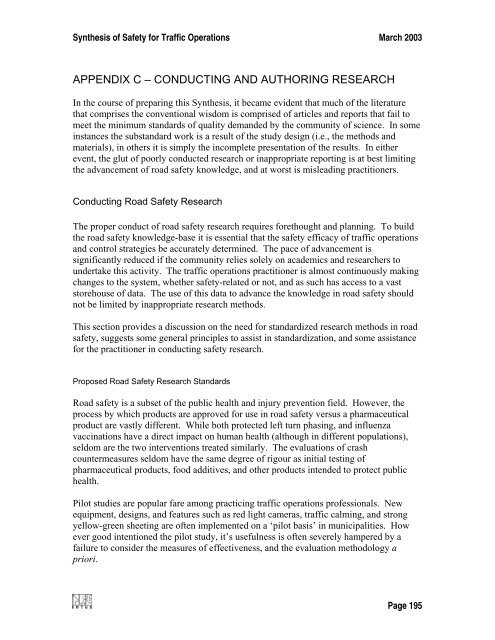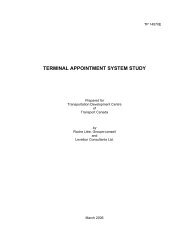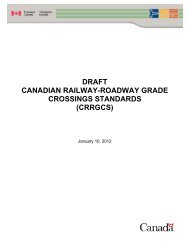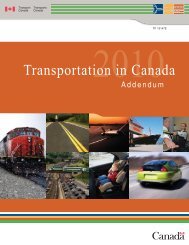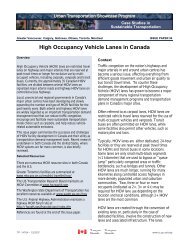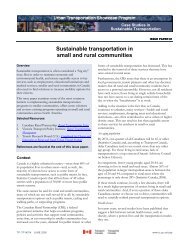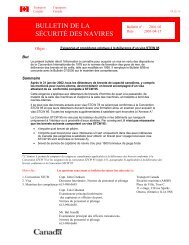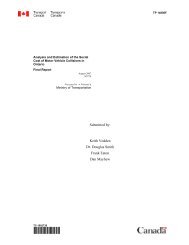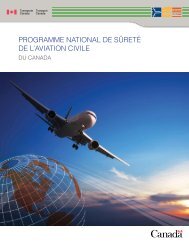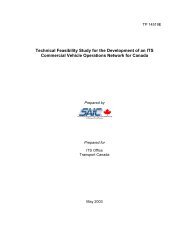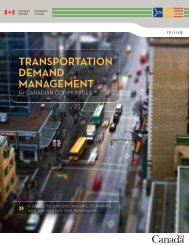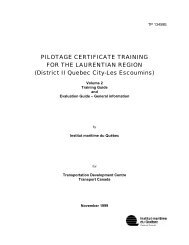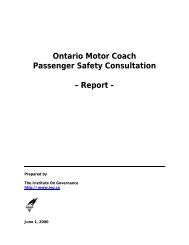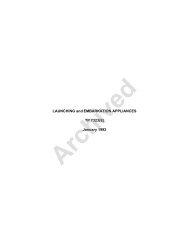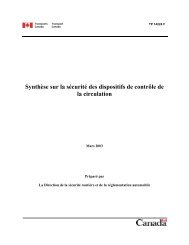Synthesis of Safety for Traffic Operations - Transports Canada
Synthesis of Safety for Traffic Operations - Transports Canada
Synthesis of Safety for Traffic Operations - Transports Canada
Create successful ePaper yourself
Turn your PDF publications into a flip-book with our unique Google optimized e-Paper software.
<strong>Synthesis</strong> <strong>of</strong> <strong>Safety</strong> <strong>for</strong> <strong>Traffic</strong> <strong>Operations</strong> March 2003<br />
APPENDIX C – CONDUCTING AND AUTHORING RESEARCH<br />
In the course <strong>of</strong> preparing this <strong>Synthesis</strong>, it became evident that much <strong>of</strong> the literature<br />
that comprises the conventional wisdom is comprised <strong>of</strong> articles and reports that fail to<br />
meet the minimum standards <strong>of</strong> quality demanded by the community <strong>of</strong> science. In some<br />
instances the substandard work is a result <strong>of</strong> the study design (i.e., the methods and<br />
materials), in others it is simply the incomplete presentation <strong>of</strong> the results. In either<br />
event, the glut <strong>of</strong> poorly conducted research or inappropriate reporting is at best limiting<br />
the advancement <strong>of</strong> road safety knowledge, and at worst is misleading practitioners.<br />
Conducting Road <strong>Safety</strong> Research<br />
The proper conduct <strong>of</strong> road safety research requires <strong>for</strong>ethought and planning. To build<br />
the road safety knowledge-base it is essential that the safety efficacy <strong>of</strong> traffic operations<br />
and control strategies be accurately determined. The pace <strong>of</strong> advancement is<br />
significantly reduced if the community relies solely on academics and researchers to<br />
undertake this activity. The traffic operations practitioner is almost continuously making<br />
changes to the system, whether safety-related or not, and as such has access to a vast<br />
storehouse <strong>of</strong> data. The use <strong>of</strong> this data to advance the knowledge in road safety should<br />
not be limited by inappropriate research methods.<br />
This section provides a discussion on the need <strong>for</strong> standardized research methods in road<br />
safety, suggests some general principles to assist in standardization, and some assistance<br />
<strong>for</strong> the practitioner in conducting safety research.<br />
Proposed Road <strong>Safety</strong> Research Standards<br />
Road safety is a subset <strong>of</strong> the public health and injury prevention field. However, the<br />
process by which products are approved <strong>for</strong> use in road safety versus a pharmaceutical<br />
product are vastly different. While both protected left turn phasing, and influenza<br />
vaccinations have a direct impact on human health (although in different populations),<br />
seldom are the two interventions treated similarly. The evaluations <strong>of</strong> crash<br />
countermeasures seldom have the same degree <strong>of</strong> rigour as initial testing <strong>of</strong><br />
pharmaceutical products, food additives, and other products intended to protect public<br />
health.<br />
Pilot studies are popular fare among practicing traffic operations pr<strong>of</strong>essionals. New<br />
equipment, designs, and features such as red light cameras, traffic calming, and strong<br />
yellow-green sheeting are <strong>of</strong>ten implemented on a ‘pilot basis’ in municipalities. How<br />
ever good intentioned the pilot study, it’s usefulness is <strong>of</strong>ten severely hampered by a<br />
failure to consider the measures <strong>of</strong> effectiveness, and the evaluation methodology a<br />
priori.<br />
Page 195


